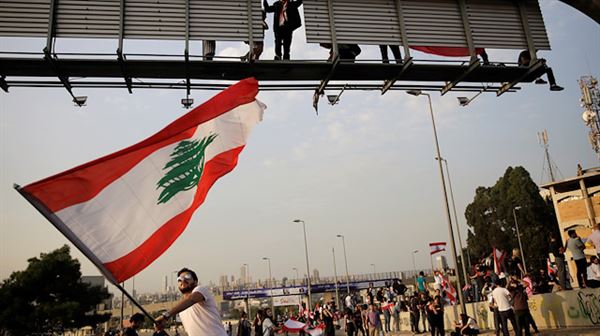Lebanon's Defence Minister said on Thursday the country was in a "very dangerous situation" and compared street unrest of recent days to the start of
Lebanon’s Defence Minister said on Thursday the country was in a “very dangerous situation” and compared street unrest of recent days to the start of 1975-90 civil war.
One month after the start of nationwide protests, Lebanon is in serious political and economic trouble with no indication of its leaders agreeing on a new government to replace the outgoing cabinet of Saad al-Hariri, who quit as premier on Oct. 29.
Despite the magnitude of the economic crisis, the biggest since the war, leaders have not been able to agree a new cabinet or to tackle the grievances of demonstrators who say they have ruined Lebanon through corruption and sectarian cronyism.
Though the protests have been overwhelmingly peaceful, a protester who was shot dead south of Beirut on Tuesday.
Defence Minister Elias Bou Saab, a political ally of President Michel Aoun, said tensions on the street and road closures “have reminded us of the civil war, what happened in 1975. And this is situation is very dangerous.”
He was referring to incidents including an attempt by protesters to build walls on the main coastal highway.
Bou Saab told reporters the protesters’ “democratic movement” was not to blame, and demonstrators had a right to protest and to be protected.
But he added that the army and security services could not accept any person thinking of taking violent actions.
Aoun said he hoped a government could be formed in the coming days aiming to meet the demand of the protesters.
But much of the country remained at a standstill, and traders said they could not pay for imports of necessities.
Schools, banks and many shops were closed for the third straight day. Some major routes around the capital that had been barricaded by anti-government protesters were unblocked by authorities, but the political mood remained brittle.
“We are closing for Alaa,” a Beirut coffee shop worker told Reuters, as she prepared to shut the store. She was referring to the protester shot dead after an altercation with Lebanese soldiers at a roadblock south of Beirut on Tuesday.
The soldier who opened fire has been detained.
“WE ARE ALL IN DEEP TROUBLE”
Nearby, a dozen or so protesters chanting “revolution, revolution” toured the centre of the capital urging shops to close to pressure leaders to agree reforms to tackle poverty, rising unemployment and worsening living standards.
Hani Bohsali, general manager of Bohsali Foods and president of the Syndicate of Importers of Foodstuffs, Consumer Products and Drinks, which represents around 50 importers, said he was among businessmen who had warned of more trouble at a meeting with Central Bank governor Riad Salameh and other top bankers.
“My message to all of them is that we are all in deep trouble, but you have to give priority to the food supply. Because the food is even more important than the fuel,” he said.
Banks, which were shut for half of October, closed again this week over staff security concerns. Most transfers out of the country have been blocked and, with U.S. dollars scarce, the pegged Lebanese pound is weakening on a black market.
“You have a problem of liquidity, and there is no solution for it, unless you put in place a proper plan to solve the problem, there is no need to open the banks,” a banker said.
By staying closed, the banks were avoiding the bigger problem of panic among depositors, the banker said.
“You need to have a political solution, to offer a little bit of confidence, and this will eventually allow you to calm down the market and reopen normally,” he said.
Lebanon’s bank staff union called on Thursday for employees to stay on strike until it received details of a security plan, especially on how to deal with customers demanding their cash.
The Lebanese pound was little changed on the black market. Dollars were being offered at 1,850 pounds compared to 1,820 on Tuesday, an exchange dealer said, around 23% weaker than the official rate of 1,507.5 pounds. The weakening pound has led some shops to hike prices of imported goods in Lebanese pounds.
The protester killed on Tuesday was a follower of Walid Jumblatt, a veteran Druze politician and former civil war militia leader, who has urged his supporters to remain calm.
Taymour Jumblatt, Jumblatt’s son and political heir, called for protests to remain peaceful.
